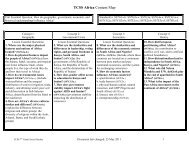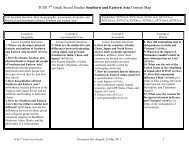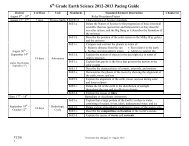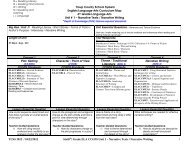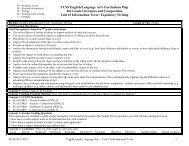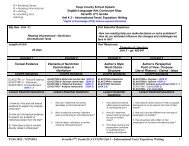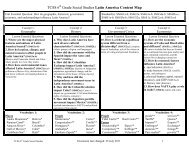TCSS English/Language Arts Curriculum Map 8th Grade Literature ...
TCSS English/Language Arts Curriculum Map 8th Grade Literature ...
TCSS English/Language Arts Curriculum Map 8th Grade Literature ...
You also want an ePaper? Increase the reach of your titles
YUMPU automatically turns print PDFs into web optimized ePapers that Google loves.
RL= Reading Literary<br />
RI = Reading Informational<br />
W = Writing<br />
SL= Speaking and Listening<br />
L = <strong>Language</strong><br />
<strong>TCSS</strong> <strong>English</strong>/<strong>Language</strong> <strong>Arts</strong> <strong>Curriculum</strong> <strong>Map</strong><br />
<strong>8th</strong> <strong>Grade</strong> <strong>Literature</strong> and Composition<br />
Unit #4 Response to Poetry<br />
Big Idea: Response to Poetry Length of Unit: 14 days<br />
Unit Essential Question(s): How does a writer use effective argumentative writing techniques to influence others to take action or change opinions?<br />
Unit Prerequisites: (based on 7 th grade curriculum)<br />
� Cite several pieces of textual evidence to support analysis of what the text says explicitly.<br />
� Cite several pieces of textual evidence to support analysis of what the text infers.<br />
� Analyze the impact of rhymes or other repetitions of sounds (e.g., alliteration) on a specific section of a story.<br />
� Analyze how a drama’s or poem’s form or structure (e.g., soliloquy, sonnet) contributes to its meaning. (7th is limited to poetry and drama)<br />
Concept 1: Textual Evidence<br />
Concept 1 Student Essential Question(s):<br />
� How does the reader analyze the types of poetry using poetic devices and sounds of poetry?<br />
Concept 1: CCGPS Standards<br />
� ELACC8RL1.a-textual evidence (analysis) [DOK 2]<br />
� ELACC8RL1.b-textual evidence (inferences) [DOK 2]}<br />
Concept 1: Teacher Guiding Questions<br />
These questions are intended to guide teacher instruction, but should not be posted. The Student EQ is provided to post and reference during the lesson.<br />
1. How will choosing textual evidence help my understanding of the text?<br />
2. How does the choice of evidence affect the credibility of my analysis of inferences?<br />
Concept 1: Vocabulary (*Review term taught in a previous unit)<br />
Evidence* Inferences* Analysis*<br />
Types of Poetry: Lyric Narrative Dramatic<br />
Concept 1: Resources<br />
� Elements of <strong>Literature</strong>: pages 673, 676, 758-765,<br />
Concept 2: Theme/Central Idea<br />
Concept 2 Student Essential Question:<br />
� How does the reader analyze the types of poetry using poetic devices and sounds of poetry?<br />
Concept 2: CCGPS Standards<br />
� ELACC8RL2.a-theme and central idea [DOK 2]<br />
Concept 2: Teacher Guiding Questions<br />
These questions are intended to guide teacher instruction during this concept, but these questions should not be posted. The Student EQ is provided to post and<br />
reference during the lesson.<br />
1. What universal truth or theme does the author convey in the poetry?<br />
Concept 2: Vocabulary (*Review term taught in a previous unit)<br />
Themes* Symbolism Poetic Technique Sensory <strong>Language</strong>*/Imagery<br />
Concept 2: Resources<br />
� Elements of <strong>Literature</strong>: Pages 674-675, 682-701, 766-780<br />
<strong>TCSS</strong> 10/1/2012 Eighth <strong>Grade</strong> <strong>Language</strong> <strong>Arts</strong> – Unit 4 Poetry 1
Concept 3: Figurative <strong>Language</strong>/Word Choice<br />
Concept 3: Student Essential Question: How does the reader analyze the types of poetry using poetic devices and sounds of poetry?<br />
Concept 3: CCGPS Standards<br />
� ELACC8RL4a-figurative language meaning of words [DOK 2]<br />
� ELACC8RL4b-analogies/allusions impact of words [DOK 2]<br />
Concept 3: Teacher Guiding Questions<br />
These questions are intended to guide teacher instruction, but should not be posted. The Student EQ is provided to post and reference during the lesson.<br />
1. How does the reader use context clues to uncover meaning in poetry?<br />
2. How do sensory details and figurative language convey meaning in poetry?<br />
3. How are sound devices used in poetry?<br />
4. How does author’s word choice affect meaning and tone?<br />
5. How do allusions/analogies expand the meaning of text?<br />
Concept 3: Vocabulary (*Review term taught in a previous unit)<br />
Simile Imagery Metaphor Analogy* Allusion* Tone<br />
Alliteration Onomatopoeia Overall Meaning Extended Metaphor Personification<br />
Concept 3: Resources<br />
� Elements of <strong>Literature</strong> Pages 670-672, 751, 772<br />
Concept 4: Structure<br />
Concept 4: Student Essential Question: How does the reader analyze the types of poetry using poetic devices and sounds of poetry?<br />
Concept 4: CCGPS Standards<br />
� ELACC8RL5.a-structure of two or more texts [DOK 2/3]<br />
� ELACC8RL5.b-meaning and style of two or more texts [DOK 2/3]<br />
Concept 4: Teacher Guiding Questions<br />
These questions are intended to guide teacher instruction during this concept, but these questions should not be posted. The Student EQ is provided to post and<br />
reference during the lesson.<br />
1. How can an author vary the poetic structure?<br />
2. How do these variations in a writer’s structure affect the meaning and style of the poem?<br />
3. How do these variations in a writer’s style affect the reader?<br />
4. How does the structure of a poem identify its purpose?<br />
Concept 4: Vocabulary (*Review term taught in a previous unit)<br />
Ode Epic Ballad Sonnet Elegy Style*<br />
Stanza Rhyme Rhythm Refrain Couplet Meaning<br />
Repetition Soliloquy Monologue Internal Rhyme Exact Rhyme Approximate Rhyme<br />
Concept 4: Resources<br />
Elements of <strong>Literature</strong>:<br />
� Pages 736-755, 670-673<br />
� Stanza page 741<br />
� Sonnet page 737<br />
� Ode page 743<br />
� Elegy page 747<br />
<strong>TCSS</strong> 10/1/2012 Eighth <strong>Grade</strong> <strong>Language</strong> <strong>Arts</strong> – Unit 4 Poetry 2
Concept 5: Writing Comprehension<br />
Concept 5: Student Essential Question: How will reading and writing all genres of poetry make me a more well-rounded and proficient reader and writer?<br />
Concept 5: CCGPS Standards<br />
� ELACC8W4-writing [DOK 3]<br />
� ELACC8W10-writing [DOK 2]<br />
� ELACC8RL10-read/comprehend [DOK 2/3]<br />
Concept 5: Teacher Guiding Questions<br />
These questions are intended to guide teacher instruction during this concept, but these questions should not be posted. The Student EQ is provided to post and<br />
reference during the lesson.<br />
1. How does re-reading poetry help my understanding of the text?<br />
2. How can reading and writing poetry provide an emotional outlet for inner feelings?<br />
3. How will reading and writing all genres of poetry make me a more well-rounded and proficient reader and writer?<br />
4. How can I become a more proficient reader?<br />
Concept 5: Vocabulary (*Review term taught in a previous unit)<br />
Ode Epic Ballad Sonnet Elegy<br />
Lyrics Dramatic Narrative Inversion<br />
Concept 5: Resources<br />
Elements of <strong>Literature</strong>:<br />
Concept 6: Grammar<br />
Concept 6: Student Essential Question: How does my use of verb forms impact my speaking and writing?<br />
Concept 6: CCGPS Standards<br />
� ELACC8L1.a-d – verbal [DOK 2/3]<br />
� ELACC8L2.a-b –punctuation [DOK 2]<br />
Concept 6: Teacher Guiding Questions<br />
These questions are intended to guide teacher instruction during this concept, but these questions should not be posted. The Student EQ is provided to post and<br />
reference during the lesson.<br />
1. What is a verbal?<br />
2. How do you use them in your writing?<br />
3. How does one maintain verb consistency in voice and mood?<br />
Concept 6: Vocabulary (*Review term taught in a previous unit)<br />
Mood* Gerund Infinitive Imperative Conditional Participle<br />
Indicative Subjunctive Interrogative Active Voice Passive Voice<br />
<strong>TCSS</strong> 10/1/2012 Eighth <strong>Grade</strong> <strong>Language</strong> <strong>Arts</strong> – Unit 4 Poetry 3
Concept 6: Resources<br />
Elements of <strong>Literature</strong>:<br />
Performance Tasks:<br />
� Multimedia Presentation: Poetry pp. 783-789 Explains the entire process from selecting the poetry, preparing background information, interpreting the poetry,<br />
preparing the script, planning the use of media, following the writers craft, and finally performing. [DOK 3]<br />
� Write a Poem: page 765 Choose a real life event you have read about or witnessed. Write a short poem based on the event (i.e. 9-11, “Winning a<br />
Championship”, “A New Baby in the Family”, “The Day My Life Changed Forever” etc.) [DOK 3]<br />
� Poetry Notebook: some teachers elect to use types of poetry and require illustration, color and original poetry for the contents of the notebook. [DOK 2/3]<br />
� “I am” Poetry: Students compose an original poem starting with the words “I am from…”, choosing all the real life things that identify who they are (i.e., I am<br />
from dirt roads, long summer days, and lemonade). This poetry should be about 30-40 lines. [DOK 3]<br />
<strong>TCSS</strong> 10/1/2012 Eighth <strong>Grade</strong> <strong>Language</strong> <strong>Arts</strong> – Unit 4 Poetry 4



